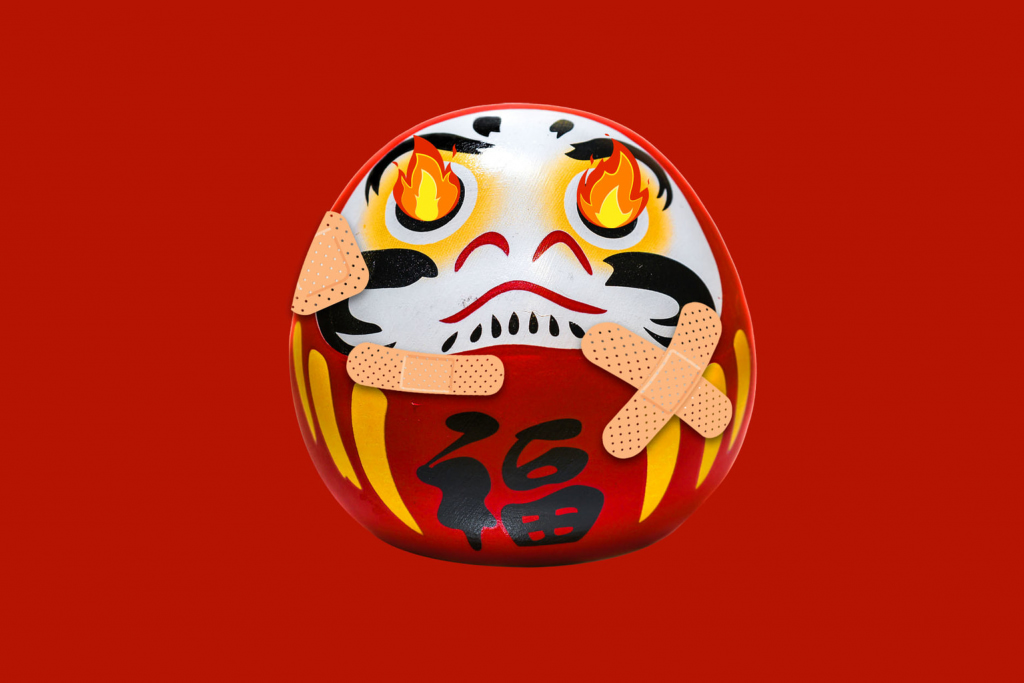Sometimes life throws you a curveball and it can knock you down to the ground. But the idiom shichiten-hakki reminds us to keep pressing on. Or, as philosopher, motivational expert and bread lover Tofu-chan eloquently puts it: “You always gotta don’t stop.”
Shichiten-hakki (七転八起)
Meaning: Fall down seven times and get up eight, never giving up, keeping at it until one succeeds, the ups and downs in life, when life gives you lemons make lemonade, failure is a stepping stone to success, when life knocks you down you should stand back up.
Literal translation and kanji breakdown: Shichiten-hakki is an especially satisfying idiom to break down: shichi (seven; 七), ten (turn, revolve; 転), ha (eight; 八) and ki (get up, rise; 起). It gives us something along the lines of “rolling seven times, get up eight” which may still seem curious — why isn’t it the word fall or tumble? — but we’ll get answers in the next section.
Note: Don’t confuse shichiten-hakki (七転八起) for shichiten-battou (七転八倒), which means writhing in agony. It’s a synonym to shikuhakku (四苦八苦), which we’ve covered before.
Shichiten-hakki: The Origins
First, let’s talk about why you fall down seven times and get up eight. Technically, this should be impossible. If you fall down seven times, it stands to reason that you also get up seven times. In this case, both seven and eight are not meant literally, but as placeholders for many of something. We’ve seen this phenomenon before in mikkatenka, where the number three is used to indicate a short or small amount of time.
However, even though both seven and eight represent many times, this still doesn’t explain why you get up more times than you fall. One theory suggests that when you’re a baby and just learning to stand and walk on your own, you can still fall. You stand up again with the support of those around you. This doesn’t need to be taken too literally: when you fail or fall, you (hopefully) have a support network of friends and family to help you rise again.
As for the expression’s origins, there are two pervading theories and they both have Buddhist roots. One says that it’s simply a part of Buddhist teachings: life is a struggle and you experience suffering, but you go on. The other ties it to the fact that people will generally get up immediately after falling, much like the Daruma doll, which will always roll back to an upright position when pushed over.
If shichiten-hakki sounds familiar but the reading doesn’t sound right, you’ve probably heard the proverb 七転び八起き (nana korobi ya oki), which has the same roots. Both are idiomatic expressions with the same meaning, but nana korobi ya oki is more commonly used.
Shichiten-hakki: Related Expressions
七転び八起き Nana korobi ya oki Fall down seven times, get up eight, keeping at it until one succeeds
しくじるは稽古のため Shikujiru wa keiko no tame Failure is part of studying, failing is practice for success
失敗は成功のもと Shippai wa seikou no moto Failure teaches success
失敗は成功の母 Shippai wa seikou no haha Failure is the mother of success
禍を転じて福と為す Wazawai wo tenjite fuku to nasu Turning disaster or misfortune into fortune, or to one’s own advantage
Using “shichiten-hakki” in a sentence
Used more in spoken language than written, it’s a convenient shorthand for the more common expression nana korobi ya oki, mentioned earlier.
頑張り屋の彼女はどんなに失敗しても、七転八起し必ず立ち直っている。Gambariya no kanojo wa donna ni shippai shite mo, shichiten-hakki shi kanarazu tachinaotteiru. She is a hard worker and no matter how many times she fails, she always gets back on her feet.
今回の試験は不合格だったけど、諦めず七転八起の気持ちで次の試験に乗りきるように頑張ると決めた。Konkai no shaken wa fugoukaku datta kedo, akiramezu shichiten-hakki no kimochi de tsugi no shaken ni norikiru you ni ganbaru to kimeta. I failed the exam this time, but I decided to not give up and to try my best to get through the next exam.
人間は意外と強い生き物だよ。七転八起って言葉あるじゃない? Ningen wa igai to tsuyoi ikimono da yo. Shichiten-hakki-tte kotoba aru janai? Humans are surprisingly resilient creatures. You know the expression “fall down seven times, get up eight”, right?
Want more? Follow our weekly Yojijukugo Japanese Idiom series, published every Friday. Learn the meaning of “kachoufugetsu” here, “jigajisan” here and “ichibu-shiju” here.









